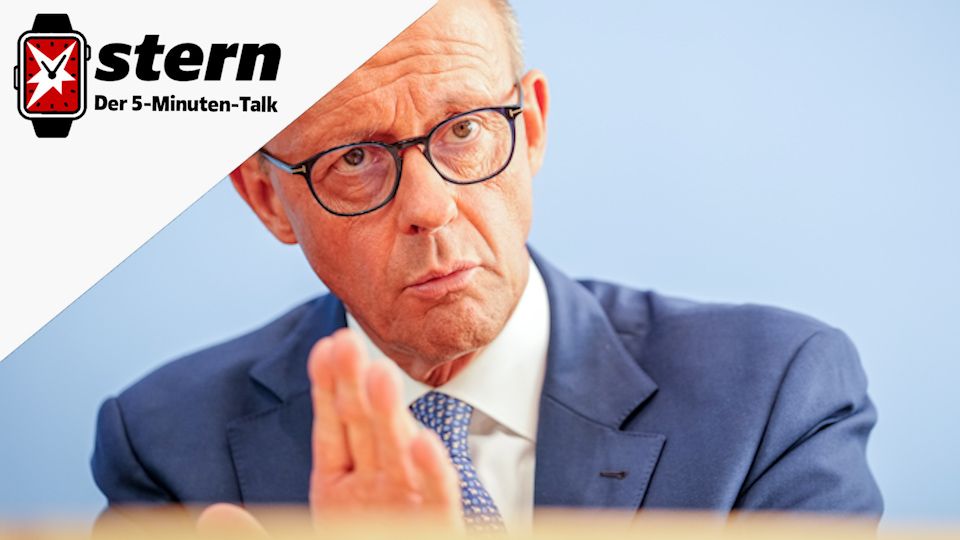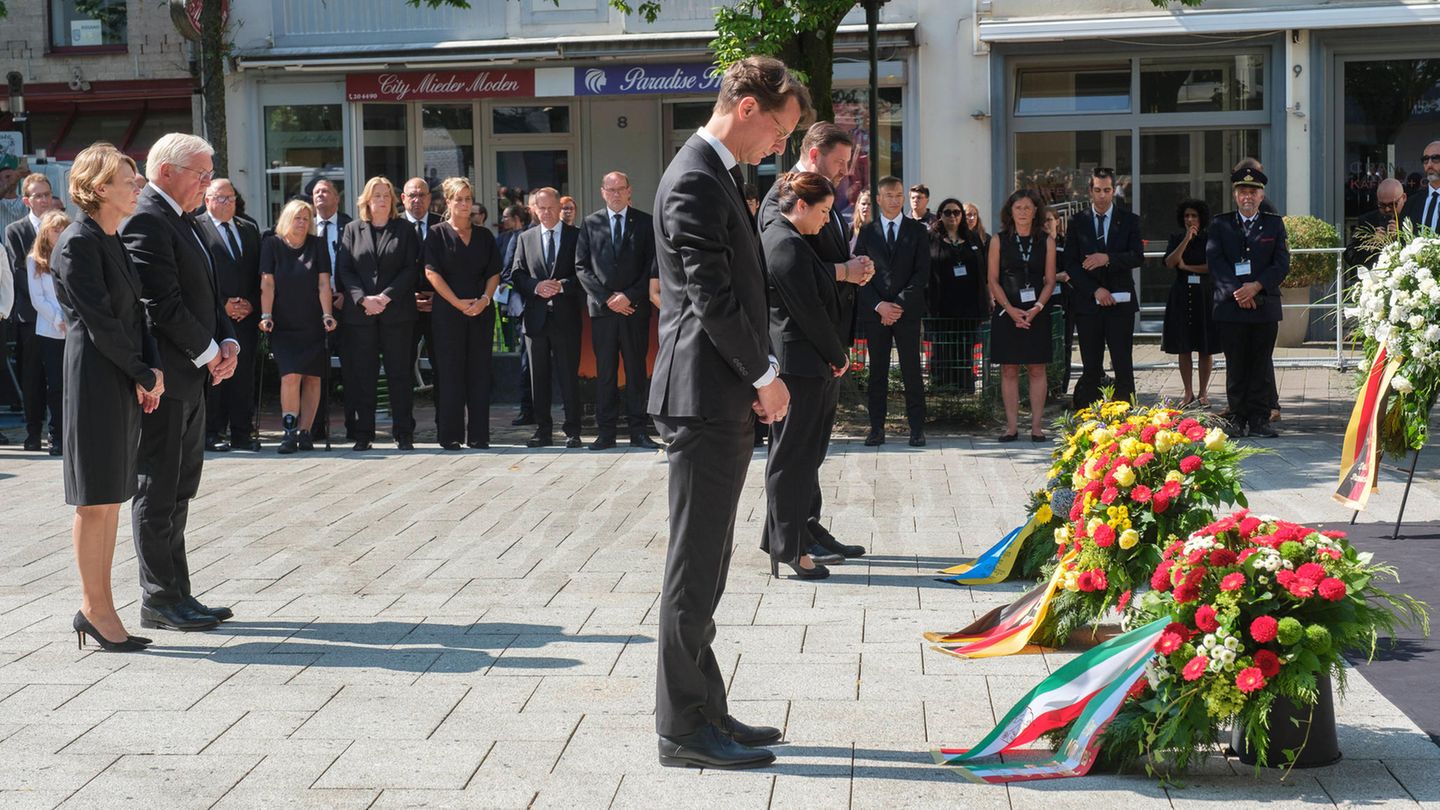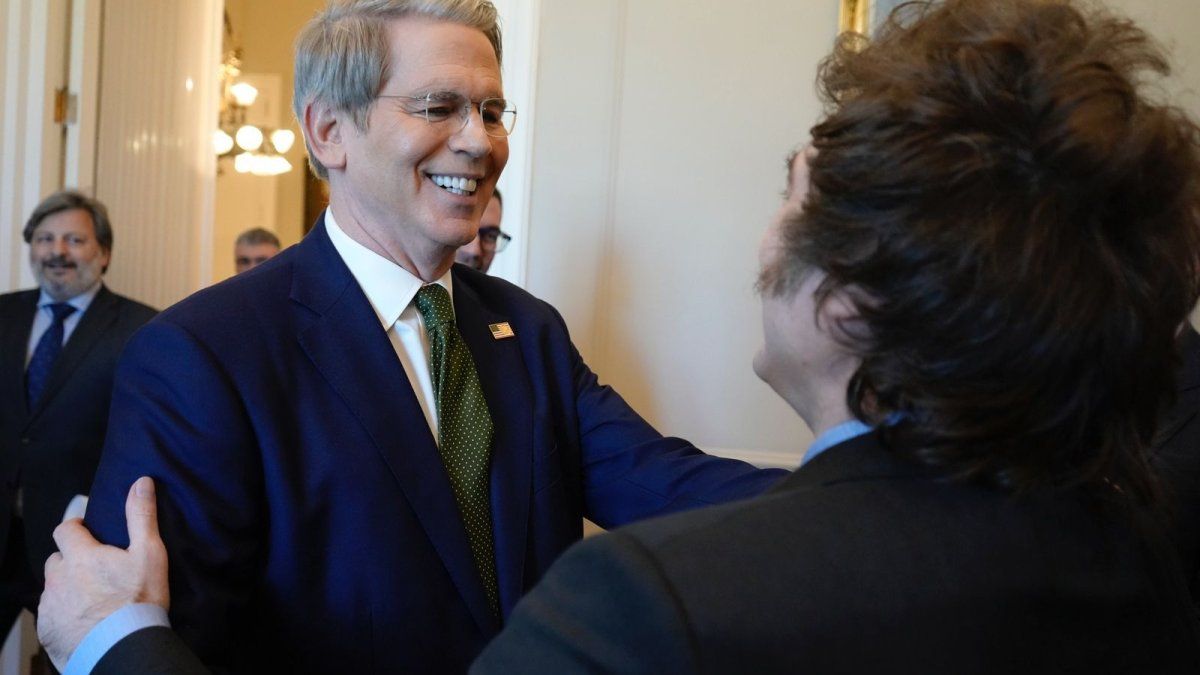Nine days after the attack, a memorial event is taking place in Solingen. The terrorist act is all the worse for the city because it experienced something similar 31 years ago.
A bell strikes three times, a short but resonating sound. Federal President Frank-Walter Steinmeier, Prime Minister Hendrik Wüst (CDU) and Solingen’s mayor Tim Kurzbach (SPD) stand silently in front of the wreaths commemorating the victims of the knife attack from just over a week ago. The scene is the Fronhof in the center of Solingen – the place where a 26-year-old Syrian killed three visitors to a city festival and injured eight others.
Commemorations with the heads of state naturally have something very official about them; they are supposed to exude a sense of solemnity. But on the sidelines of this memorial service, there are also always intimate encounters: Wüst and Federal Minister of the Interior Nancy Faeser (SPD) on a bench, deep in conversation with one of those affected, Federal President Steinmeier in dialogue with citizens.
He asks a woman if she can still remember the arson attack in Solingen in 1993. “My son was just three years old then,” she replies. “The wounds had healed to a certain extent after 30 years,” says Steinmeier. “Are you confident that the wounds can heal now, after many years? That the city’s society will come together again?” Yes, that will probably work, he hears. In the future, the victims of both crimes will be included in the commemoration.
The crime has retraumatized Solingen
Steinmeier was in Solingen just last year, on the 30th anniversary of the arson attack. The house of the Genc family of Turkish origin burned down on the night of May 29, 1993. Five girls and women were killed. The former North Rhine-Westphalian Prime Minister Armin Laschet (CDU) once described this attack as “the most terrible event in the history of the state of North Rhine-Westphalia.” Solingen became a symbol of the wave of racist violence in the early 1990s.
Living with this in the long term is anything but easy for a city’s self-image, but Solingen has mastered this challenge to such an extent that in 2023 Turkish Deputy Foreign Minister Yasin Ekrem Serim certified that the commemoration of the attack was now part of the “DNA of the city”.
But now the unfathomable: The same city is shaken by an ideologically motivated crime for the second time, this time a suspected Islamist randomly murders people who want to relax at a city festival on a Friday evening to end the week. Once again, the name Solingen does not stand for a medium-sized industrial city in North Rhine-Westphalia, where people of different origins live together happily every day. No, after Solingen was another word for right-wing violence for decades, the city must now serve as a symbol for the return of Islamist terror. This experience must have retraumatized Solingen.
Steinmeier’s “earnest wish”
“This city has been hit again,” said Prime Minister Wüst in his speech at a memorial service in the city’s theater and concert hall. “Why always Solingen?” asked Mayor Kurzbach. Referring to the biblical Job, who judges God in the face of a chain of disasters, the Catholic politician said: “What is happening to us in Solingen is not fair.” But one thing is certain: “We will never lose our faith in good because of this.”

Totally against the Chancellor: Is Merz overdoing it with his asylum policy?
05:08 min
This is precisely Steinmeier’s “fervent wish”: “Let us not allow ourselves to be driven apart, not incited against one another. Let us stand together!” The head of state reminds us that in the last century many Germans only survived the Nazi era “because other countries kept their doors open and showed humanity”. That is why the right of asylum for those persecuted for political reasons was written into the constitution 75 years ago, and for good reason. It must remain that way – but Germany can only achieve this if it does not overburden itself. Wüst says it again shortly afterwards, almost exactly the same: “We must not overburden those who are well-intentioned.”
Solingen can look up to a great role model
What now? Fortunately, the long-suffering city has a great role model to look up to in this situation: Mevlüde Genc (1943-2022) from Solingen. She lost two daughters, two granddaughters and a niece in the 1993 arson attack, but that did not stop her from staying in Solingen, consciously applying for German citizenship and repeatedly calling for reconciliation. The city has now named a square after her, and the country has dedicated a prize for understanding and tolerance to her, the Mevlüde Genc Medal. These days, her words carry particular weight in Solingen: “Hate brings death,” she said. And: “Let us look forward to the good.”
Source: Stern
I have been working in the news industry for over 6 years, first as a reporter and now as an editor. I have covered politics extensively, and my work has appeared in major newspapers and online news outlets around the world. In addition to my writing, I also contribute regularly to 24 Hours World.




